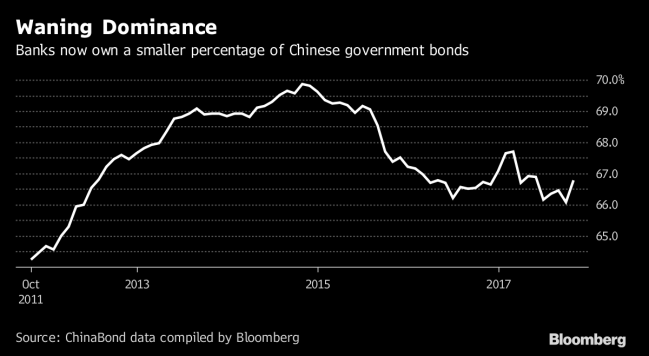(Bloomberg) -- Banks -- the most powerful group in China’s bond market -- may hold the key to reversing the nation’s sovereign debt selloff. Problem is, government policy is keeping them at bay.
Even with yields surging to a three-year high, banks are staying put. The percentage of sovereign bonds owned by lenders dropped to a five-year low of 66 percent in September, compared with a record-high 70 percent in 2014, and market participants say they’ve not seen much evidence of a pickup in demand.
Banks are facing a rapid slowdown in savings, thereby limiting the firepower they have to use, partly due to a crackdown on wealth management products. At the same time, they are being encouraged to shift more of their funds into loans in order to maintain a steady economic expansion. While yuan deposit growth hit a record low in August, the average amount of monthly new loans is poised to rise to a record this year.
"Since the start of the year, banks’ bond investment has weakened, mainly because their loans have increased quickly,” said David Qu, a market economist at Australia & New Zealand Banking Group Ltd. in Shanghai.
This structural predicament -- inherent in China’s desire to deleverage without sacrificing growth -- is one of the reasons why relief is unlikely for the bond market any time soon.
China’s current policy is like “asking the horse to run (support for the real economy through loans and direct financing) but not letting it eat grass (low excess reserves, high funding cost),” Zhang Jiqiang, a fixed-income analyst at China International Capital Corp., wrote in a report.
While the expansion of shadow-banking products has slowed, cash has not returned to banks. M2 money-supply growth reached an all-time low last month. Banks may also be under pressure to buy municipal bonds instead of sovereign securities, in order to attract deposits from local authorities, according to Li Qilin, chief macroeconomic researcher at Lianxun Securities Co. Debt issued by local governments swelled to 4.2 trillion yuan ($635 billion) so far this year, compared with 2.9 trillion yuan of sovereign debt.
“This year’s adjustment has been to reduce money-supply growth but stabilize loans,” said Shi Lei, chairman of investment advisory Attractor Adviser Ltd. in Shanghai. “The real economy is still adding leverage; it’s just the financial system that’s been deleveraging.”
Read more: how bond losses compare with other Chinese investments
This strategy would seem to run counter to policy makers’ goals. President Xi Jinping in July spoke about lowering borrowing in the entire economy, rather than the financial system alone. For years, reducing reliance on loans by supporting direct financing methods such as bonds has also been a recurring theme for reforms.
As banks bought fewer government and policy bank bonds, other buyers stepped in. Yet trading-oriented investors such as mutual funds don’t tend to hold till maturity; instead, they are tempted to sell as soon as expectations for capital gains turn, leading to a vicious cycle, Tianfeng Securities Co. analysts Sun Binbin and Tang Xiaotian wrote in a note.
Chinese government bonds are poised for their biggest annual decline since 2013. The 10-year government bond yield slipped to 3.96 percent on Thursday morning, compared with 3.99 percent on Tuesday, the highest close since October 2014. The central bank boosted the supply of cash in the financial system by the most since January on Thursday, after the bond selloff started to weigh on equities.
Many analysts are already looking ahead to the new year, when demand from banks and insurers is typically stronger. As yields rise, relief could also come from a turn in monetary policy or a slowdown in corporate borrowing.
“Banks would then have more cash to allocate to sovereign bonds,” said Lianxun Securities’ Li said. “But we will have to wait for some time before the market finds that balance.”
(Updates with bond prices and cash injection in third-last paragraph.)
